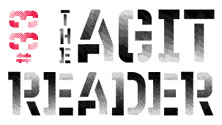
by Dave Thompson
Backbeat Books
I highly respect Dave Thompson. Over the years, he’s been among the upper echelon of music critics, equipped with a deep remembrance of nostalgia both in American rock and that of his native Britain. In balancing the two, he's usually produced a keen scalpel with which to pick apart modern times. He’s got his voice, an unrelenting/uneven language much like the guy who writes the forward here (the superiorly talented Richard Meltzer). You could almost say he’s part of a dying breed, if he didn’t have to shill pitches for Red Hot Chili Pepper tomes and five-star reviews for bloated dinosaurs. But in a time when writers are paid in promos, he’s still all about the love, going above and beyond, and in this book he’s intensely passionate about its subject. However, if you’re of the generation where your formative years were spent on the Lollapalooza lawn, there’s a chance you’ll end up despising the guy’s perspective.
I Hate New Music basically states in lightning-quick prose and in a list of cardinal rules, that “Rock N’ Roll” (it’s never supposed to be “rock and roll”) died shortly after 1978, a year when Boston, Foreigner, and R.E.O. Speedwagon were multi-million selling, stadium-filling bands. Many of his truths are, even when from a different generation than Thompson, untouchable. Led Zeppelin, Black Sabbath, the Beatles and Stones are universally hailed as sacred cows: that’s an absolute. And in that regard, valuing that age of rock as “classic,” there really isn’t much competition once music shifted into the “modern” era. His arguments as to what has been lost post-1978—double-concept records, side-long cuts, definitive live albums, prolific release schedules, constant touring, seismic shifts in rock stars’ imagery and identity—is compelling. It’s a line in the sand that, as a reader, forces you to choose a side. There is no grey matter.
And that’s where Thompson falters. In over-romanticizing the late ‘60s and early ‘70s, chapters on Clapton as God, or the power of Frampton Comes Alive, and the superfluous merits of ELP or Ten Years After, do little to back his judgment. Instead, he codifies the decade and what he deems “classic” into one wild party, infallible in it’s attachment to the culture of the times. I’ll buy the fact that the rebellious spirit of rock is lost on a new generation, and the way in which we now consume these re-treads is entirely disposable compared to owning a vinyl copy of Physical Graffiti. Yet there’s no forgiveness for the Eagles and Santana (both immortalized within) or the countless ‘70s wash-ups in the dollar bins. Granted Thompson does blame these rock icons for continuing in old age, pandering to global causes and generally stinking up the ‘80s, but he goes on to demonize almost any upstart (sans Nirvana) of the next 20 years as flaccid versions of their forefathers. More than once he makes reference to Radiohead and the White Stripes and completely misses the mark in his comparisons (cawing like an out-of-touch record store clerk). He completely skips over the resonance of punk and new wave, underground college rock, vintage hip-hop and the pinnacle of alternative radio. There might not be another Woodstock/Altamont, another White Album or Dark Side of the Moon, but that’s a given. Thompson’s obliviousness to the great achievements of his juniors translates into a flimsily researched rant. And in that diatribe it sounds like Thompson is bitter to some degree, on the other edge of that generational gap critics never want to reach. Or he’s just pulling our legs, bringing on the debate and urging the 18–35 demographic to create a golden age of their own and leave his the hell alone.
Kevin J. Elliott
Girl Talk Live Review
The Pigfuck Top 10
The Clash Book
Live reviews of Boss Hog, Red, Hot + Rio 2, and Duran Duran
The Second Coming of the Buddha Machine
The Pitchfork500
The Flaming Lips' Christmas on Mars
Happy Mondays: Call the Cops
Lou Reed's Berlin
The Elephant Six Holiday Surprise Tour in Columbus
Jandek at the Wexner Center
Live reviews of My Morning Jacket and Echo and the Bunnymen
Radio Silence/A Selected Visual History of American Hardcore Music
Columbus Discount Records vs. Sub Pop
